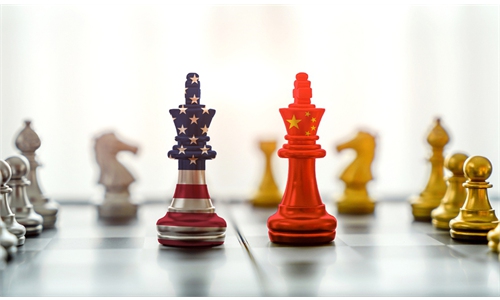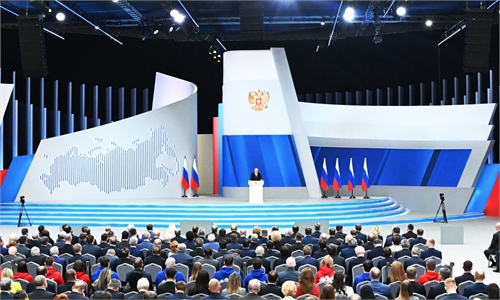Why is the West inventing an imaginary Arctic threat of China-Russia cooperation?

NATO eyes expansion into the Arctic. Cartoon: Vitaly Podvitski
A collection of Western media outlets from the US' NBC News to the UK's Daily Mail and Canada's The Globe And Mail have hyped up a report from open-source intelligence firm Strider Technologies in February about growing China-Russia economic cooperation in the Arctic. Energy and logistics investments are misportrayed as being driven by secret military intentions. However, the real secret intentions are those of the Western media, conjuring up perceptions about China's intentions in the Arctic.
Before explaining what's driving this latest information warfare narrative, it's important to remind the reader about a few facts. A 2017 law of Russia banned shipping oil, natural gas and coal along the Northern Sea Route (NSR) under a foreign flag, while a 2018 law mandates that these ships will also have to be built in Russia.
What this means is that Russian-built and Russian-flagged ships are the only ships allowed to export these resources through that new maritime corridor. A 2022 law stipulates that all foreign vessels must require prior permission, and only one can transit at a time.
With these legal facts in mind, the Western media's innuendo that China might soon take de facto control of the Arctic is dispelled. China-EU trade via the NSR would be carried out due to buyers and sellers reaching an earlier agreement per the norms of international commerce so there's nothing for the West to worry about and they actually should be pleased that there won't be restrictions on those vessels.
Chinese commercial vessels can transit through the NSR just as freely as European, Indian and all others can, but there is an obsessive focus on Chinese vessels and China's investments in Russia's Arctic region belies ulterior motives on the West's part. Like China, India also plans to invest more in oil, gas, coal and logistics projects there, but Delhi hasn't yet approached Beijing's level in this respect due to its comparative dearth of the excess capital required despite having the political intent to commit.
Nevertheless, the Western media doesn't fearmonger about India supposedly plotting to take de facto control of the Arctic, nor does it claim that Russia has become dependent on it like they say about China despite India scaling up its purchase of Russian crude by a whopping 13 times since 2022. Unlike China, however, India hasn't been designated by Western policymakers as a "rival" and that's why they don't concoct conspiracy theories about its intentions with Russia or in its Arctic region.
This insight segues into an explanation of why the West is lying about China's intentions in the Arctic. The larger context within which Strider Technologies' report was published and amplified by Western media is that the latest dynamics of the conflict in Ukraine have once again turned against Kiev and its allies. The failure of summer's counteroffensive prompted newly appointed Commander-in-Chief Alexander Syrsky to admit that "We have transitioned from offensive actions to conducting a defensive operation."
The congressional deadlock over more Ukrainian aid has sparked panic and made the West wonder whether it's possible to strategically defeat Russia as they wanted. The writing on the wall reads that this is a political fantasy, however, and that the conflict will inevitably end in a political compromise whenever that may be.
That being the case but remembering that the US wants to kindle Russia-Europe tensions indefinitely so as to divide-and-rule them to its hegemonic benefit, there's a certain logic inherent in fearmongering about China-Russia cooperation in the Arctic. This is intended to open up another "new cold war" front after the hot one in Ukraine closes, which would also justify Finland's and Sweden's inclusion in NATO membership, both of whom are part of the Arctic Council.
That organization will therefore soon be just Russia and NATO upon Sweden joining the bloc, and the US will predictably try to further impede its functioning and politicize it as yet another way to contain Russia. The pretext for doing so appears to be the information warfare narrative about China's growing investments in the region, which are twisted to falsely imply aggressive and hegemonic intentions. The reality, however, is that it's these lies about its intentions that are spewed for those exact same reasons.
Those who fall for it will be more amenable to American efforts to perpetuate Russia-Europe tensions after the hot phase of the Ukrainian conflict ends on the artificially manufactured pretext that was described above. The purpose behind doing so is to exploit Finland and Sweden's inclusion in NATO membership as means to contain Russia in the Arctic, both via the Arctic Council and, of course, through the deployment of more US weapons, bases and troops there.
This plot can be partially counteracted by raising wider awareness among the Western public of Russian legislation regulating non-commercial maritime activity in the Arctic as well as the ways in which the EU will benefit from trading with China across the cost-effective and faster NSR. It might not be able to stop policymakers from pushing through their aggressive and hegemonic agenda, but it could make these moves unpopular with the masses, who'd then realize the ulterior motives being pursued by them.
The author is a Moscow-based American political analyst. opinion@globaltimes.com.cn


